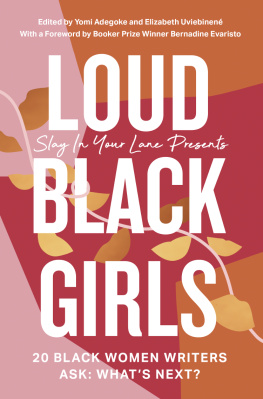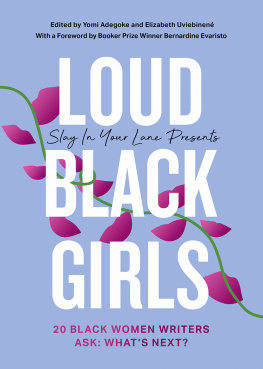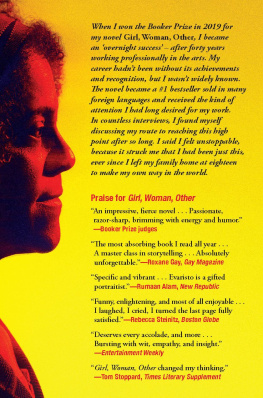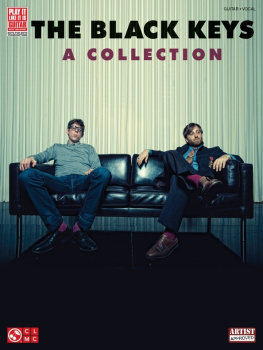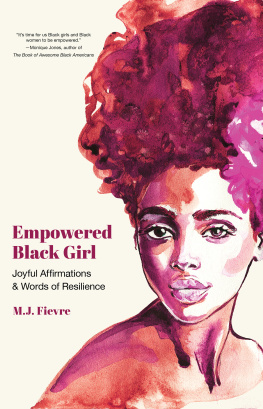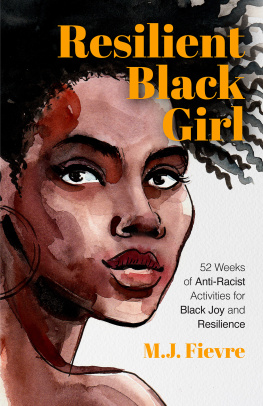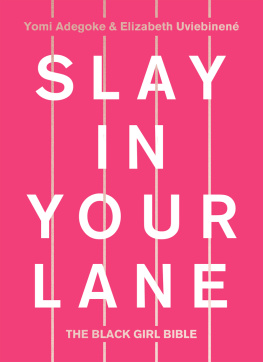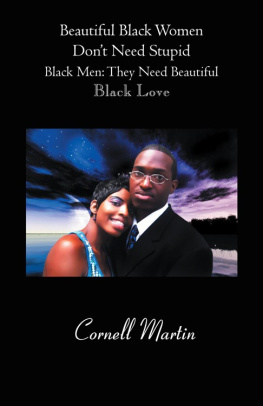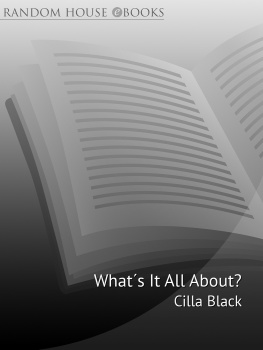Contents
Guide
LOUD BLACK GIRLS
20 Black Women Writers Ask:
Whats Next?
Elizabeth Uviebinen
and
Yomi Adegoke

4th Estate
An imprint of HarperCollinsPublishers
1 London Bridge Street
London SE1 9GF
www.4thEstate.co.uk
This eBook first published in Great Britain by 4th Estate in 2020
Copyright Elizabeth Uviebinen and Yomi Adegoke 2020
Elizabeth Uviebinen and Yomi Adegoke assert the moral right to be identified as the author of this work
A catalogue record for this book is available from the British Library
Information on previously published material appears .
All rights reserved under International and Pan-American Copyright Conventions. By payment of the required fees, you have been granted the non-exclusive, non-transferable right to access and read the text of this e-book on-screen. No part of this text may be reproduced, transmitted, down-loaded, decompiled, reverse engineered, or stored in or introduced into any information storage and retrieval system, in any form or by any means, whether electronic or mechanical, now known or hereinafter invented, without the express written permission of HarperCollins
Source ISBN: 9780008342654
Ebook Edition October 2020 ISBN: 9780008342630
Version: 2021-04-13
Contents
Black British women have always had a lot to say about everything, but until recently our voices rarely made the transition from our personal conversations into the public sphere. However, the days when our absence as writers from discussing the important issues of the day are, hopefully, coming to an end. Painfully, perhaps shamefully, it was a silence that seemed to go unnoticed by everyone but ourselves.
While there is a long heritage of black women publishing in Britain going back to Phyllis Wheatley in the eighteenth century and Mary Seacole in the nineteenth century, books have nonetheless been few and far between. This appears to be changing, and we are starting to be heard on an unprecedented scale through the recent publication of several bestselling and hugely acclaimed non-fiction books that have hit the headlines such as Slay In Your Lane by the editors of this anthology, Brit(ish) by Afua Hirsch, Dont Touch My Hair by Emma Dabiri, I will not be erased by gal-dem, Sensuous Knowledge by Minna Salami and Why Im No Longer Talking to White People about Race by Reni Eddo Lodge. Black women are also being sought for our opinions as journalists and essayists in the media. The barriers that previously existed seem to be slowly dissolving, in no small part due to the power of our collective voices on social media where weve discovered both a global and local appetite for what we have to say. Today we are adding fresh perspectives and ideas to the intellectual conversations of our times society, politics, culture and always from the unique specificities of our experiences and intersecting identities. Its not that weve never had champions speaking at every level from and about our communities before, but rather that we havent had enough of them. And because its challenging to access records from the pre-Internet past, dispersed and under-archived as they are, even when the will is there, the legacy remains unknown. Thankfully, todays essayists, speakers, writers and opinion-formers are leaving substantial digital documentation, which means that this new history-in-the-making will not be so easily erased or hard to access for future generations. One hopes that so long as the Internet shall live, the archive of our lives and contributions will survive.
We black British women are minoritised in Britain in the twenty-first century on account of our skin colour and gender, primarily, but Loud Black Girls shows that we are fighting back through the power of essays that recontextualise the hegemonic structures of Britain simply by positioning black women at the centre of public discourse and therefore transforming the conversations. We have always valued ourselves, of course. We have always been at the centre of our own existence. We have always been as individualised as any other demographic, and the twenty writers in Loud Black Girls exemplify our endless possibilities as thinkers, creators, activists, challengers. The fact is that plurality, polyvocality, multiplicity however we describe it functions to counterbalance invisibility and reductionist stereotyping, and this anthology spills over with a thrilling range of voices. Among these pages you will find women writing about career paths, the ethics around influencers working with brands and issues around social media; there are questions around black womens roles and voices in theatre, and the semantics and implications of labelling as it pertains to people of colour. We also hear about cultural and generational differences, as well as discussions of representation, isolation, and perspectives around sexuality, gender, family, violence, self-discovery and the future.
I so enjoyed stepping inside the minds of these younger women who have so much to say, so much to express, so much to challenge. Yet we also have so much further to go, so much more to address and interrogate. Nobody can speak up for us, and each generation has to take on the challenge of speaking up for themselves. This is an exciting era; long may it continue. We are becoming known. We are being heard. Now is our time.
BERNARDINE EVARISTO
Writer, Booker Prize Winner 2019 and Professor of Creative Writing, Brunel University
London
In 2018, Yomi and I threw a brunch in a private room at a London restaurant to celebrate the publication of our first book, Slay In Your Lane, bringing together a group of black women we had long admired. After the brunch ended a few of us moved to the main part of the restaurant to continue our conversations. Twenty minutes later we were kindly informed that we were talking too loudly and asked to quieten down. When we looked around, we could see that the whole restaurant was filled with people talking very loudly, yet we seemed to be the only people being chastised. We looked at each other in disbelief, but we were not surprised; we immediately knew what was going on. We were the loud black girls. Our presence had been felt and it wasnt welcomed; our voices were welcomed, but only when they were contained in a separate room and sadly our experience, while frustrating, wasnt isolated.
Being a loud black girl isnt about the volume of your voice; and using your voice doesnt always mean speaking the loudest or dominating the room. Most of the time its simply existing as your authentic self in a world that is constantly trying to tell you to minimise who you are.
Meghan Markle, speaking on a Royal Foundation Forum panel in 2018, pointed out something that encapsulates exactly how I feel about having a voice. She said, Whats interesting is, I hear a lot of people when speaking about girls and women empowerment youll often hear people say, well, youre helping women finding their voices and I fundamentally disagree with that. Women dont need to find a voice, they have a voice, and they need to feel empowered to use it, and people need to be encouraged to listen.
I couldnt agree more. Its like when we see a racist or sexist marketing campaign and as part of the backlash Ive often heard people say, This is why they need to hire more black people or women, etc. so these things dont happen. Yes, hiring is a factor but we have to also recognise that there are people who are currently sitting in those rooms and dont feel empowered enough to use their voice.

